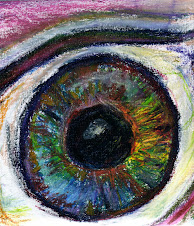Let me tell you about a fourth grade home-schooled boy. We'll call him Charlie (not his real name but he is a real boy). When Charlie's mother first called me she was really concerned about the fact that despite her background and advanced degrees in teaching, Charlie could not read with any fluency. He took forever to do his assignments, made very frequent reversals in reading and writing, and was not advancing at a pace that should have been possible given his obvious intelligence and ability to handle advanced concepts whenever they were presented orally. Charlie's mother agreed to help review the material which would soon become the Eye Can Too! Read series of books because she was ready to try anything. After having Charlie attempt to do some of the activities, she realized that his visual skills were very poor indeed. We helped her to locate a developmental optometrist in her area who concurred, gave appropriate diagnoses, and began to supervise a program of vision therapy to address the various layers of Charlie's difficulties. These included eye movement deficits, convergence insufficiency, and visual spatial as well as visual perceptual developmental delays. Did I mention that Charlie HATED to read? Well, he, like many children with learning related visual deficits, hated to read.
So, here's the good news. Six months later, this week, Charlie's mother told me that she couldn't find him when she wanted him to do something last week until she looked in the living room. Charlie was curled up in a chair reading a Hardy Boy mystery book all by himself. It was the first time that his mother had ever seen him choose to read and also continue to read for an extended period so she left him alone. 40 minutes later she asked him why he was reading.
"I like the book," he answered. "The words do not disappear at the end of the lines [like they used to]. My eyes are not in pain anymore. It doesn't hurt. It's easier."
Once again I conclude that children who resist reading or who seem to find it excessively difficult may have learning related visual issues which can be addressed through a program of optometric vision therapy under the supervision of a developmental optometrist.
Friday, February 27, 2009
"I like the book...my eyes are not in pain anymore"
Subscribe to:
Post Comments (Atom)





No comments:
Post a Comment